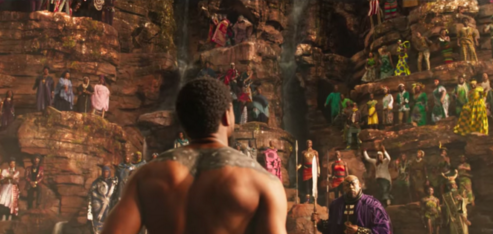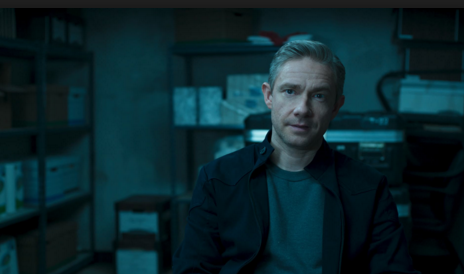
There’s been some talk of this not being the first black superhero film, that “Blade” in 1999 or 1995’s “Spawn” (or that terrible Shaq vehicle “Steel” in 1997) were first. Such talk is ridiculous hair-splitting. There’s never been ANYTHING like “Black Panther” in this genre — where the lead and the supporting cast alike are black.
“Not to put too fine a point on it, but this movie changes everything. For young people to see a cast like this where we’re not the tokens, where we’re not the first people to die? If you’re brown or black and you’re looking up on a movie screen and seeing yourself as a central character driving the story? That’s a game-changer.”
So I said when my old Atlanta Journal-Constitution colleague Richard Eldredge, founder and editor of EldredgeATL.com, came calling to get my take (along with others’) on “Black Panther” in the leadup to the film’s release in February 2018. But I really did not quite understand just how much this film would shake the paradigm.
The significance of this manifests in a number of ways. First, dark-skinned actors are central for once. There’s no tokenism. There’s no Magical Negro to help the white hero grow. There’s no Black Vacuum Law of Science Fiction (where the black character has well under 50% chance of survival). There’s no white savior.
Also, unlike virtually every other film featuring a bunch of us, we have actual agency. This is no “Detroit,” no “12 Years A Slave,” no “Selma,” no “Green Book,” in which to so much as raise one’s voice against a white character invites severe consequences up to and including death. This is a movie where a black man can literally shout “YOU CANNOT TALK” to a white figure and that character just has to
SHUT.
The [expletive].
UP.
That’s refreshing as hell.
And with a nearly $200M box office in its first three days and an eventual domestic take of over $700M (only the third film ever to do so), it should put to absolute death the notion that a mostly person of color cast can’t succeed financially. It helps that the Marvel Studios franchise is “colorblind” but, unfortunately, American society by and large is not.
By and large. But not entirely. Though America has made enormous strides in the area of race, it remains an ocean of white supremacy in a lot of ways that aren’t immediately obvious.
An interesting set of anecdotes illustrate this.
- Take my friend “Jane.” Jane is a white woman who loves Black Panther as a character. She was one of the first who flat-out loved my BP cosplay at a Halloween event — and this was well ahead the character’s 2016 screen debut. She’s what I would call a white ally to black folks in various issues. And she also loved the film “Black Panther.” But despite all that, she still had to admit with candid embarrassment that after seeing the film, she did not quite identify with anyone in it.
- Or take Michael Clark, the regular film reviewer for my newspaper, who also wrote his review for “Black Panther.” Although a generally positive review, at one point he said the white character of CIA agent Everett K. Ross (Martin Freeman) is indispensable to the narrative.
Don’t get me wrong: I love this take on Agent Ross. I actually think he’s an important character in certain ways. But he’s not vital, not to the narrative. Not at all. He’s just the one that Clark could identify with. - A 60-ish white woman at my third screening said, with some surprise and relief, that the film was simply a rousing story, and that it wasn’t anti-white. I was amused. Why would she assume it was going to be?
- Another friend, “Joey,” said that although he liked it, he found the fact that he didn’t know any of the characters held him back from fully identifying with the cast.
All these folks have swum in this American culture that is white supremacy for so long that the overwhelming blackness of “Black Panther” leaves each a little bit adrift, especially Joey, who’s something of a victim of the fact that said culture has marginalized people of color for so long that he never got the chance to discover these similarly marginalized characters. That anonymous white woman went to “Black Panther” expecting her people’s sins to be laid bare the way MOST black-cast stories tend to do (because historically, the only such films that have black casts tend to tell black people’s struggle stories — and those often aren’t a good look for white people). The self-aware Jane recognized how the culture affected this aspect of her film-going experience and sat in the discomfort. Clark, on the other hand, clung to the one familiar thing — a sympathetic white character onscreen —and elevated him to a level of importance that he doesn’t deserve.
But let’s talk about Agent Ross a bit, and the level of importance he DOES deserve.

Usually, the white guy in this sort of unusual cast is the Everyman, and Ross is just that — with a twist. He’s every white man when encountering black folks. His early arrogance is born of his American privilege, and as such he is, at first, an impediment to our heroes, much as white privilege is problematic in white people’s dealings with black folks.
But “Black Panther” turns the tables in a number of ways here.
- He’s not central. This isn’t surprising, given the nature of this film’s cast. What is surprising is…
- He’s not the viewpoint figure. Frequently when introducing a fantastic world like Wakanda’s, a story would put us in the shoes of a character like Ross to ask the silly questions that people from outside that world would ask. But “Black Panther” requires us to come alongside the Wakandans first, to identify with them and then watch Ross try to catch up. Which leads to the next point…
- He’s out of his depth. Ross is constantly having to tag along and ask questions just to keep up with native Wakandans. But this new humility serves him well, because…
- He learns to trust and not be in control. As a CIA guy, he’s never been able to trust anyone. It’s an occupational hazard. Now, with the Wakandans, he finds himself with no choice but to trust the experts.
- He becomes a true ally. In the end, he’s instrumental in helping the heroes win with his knowledge of American systems (and, later, his piloting skills). And then he sits back and quietly smiles without taking credit later.
Ross is a near-perfect picture and allegory of white allyship in the real world.
He knows he has something to contribute, and white folks definitely have a lot to offer. But he knows he’s not the center: He shuts up and listens when told to and never tries to center either himself or his privilege (in the movie, being American; in real life, being a “colorblind” person) in the conversation, nor does he attempt to appropriate the fight for Wakanda into a fight for the world. White people aren’t used to not being in control, especially in the context of living around people of color. But Ross accepts this non-central role, and by listening to the experts in this unfamiliar world — and as a white person in a black culture, he is decidedly not the expert — he is well positioned not to save his new friends, but to save the world alongside them.
The short of it: He doesn’t go “all lives matter” when the fight is for the fate of Wakanda — even if all the lives ARE at stake.
I’ve often said that one of the chief realities of American history is this: In the story of racial justice, white people are not and have never been the heroes. Most of the time, they are either the villains or the oblivious bystander who doesn’t want to get involved. At best, they can be the indispensable sidekick who saves the hero at a key moment — like Agent Ross.
But that’s not a bad thing. Be like Agent Ross.
This allegory of allyship is only made possible by the overwhelming melanin onscreen. And that’s what makes this film such a cultural watershed. It’s indeed one of the reasons “Black Panther” has received a worthy Oscar nomination as Best Picture (and maybe should have won).
———
I opened this with a quote regarding the future, post-“Black Panther” reality. Let me close this installment with a personal anecdote about the potential effect of this cast’s blackness.
Back in the 1980s, I began creating my own comic book characters after long years of pretend adventures and story lines with my younger brother. At first, the characters were all anthropomorphic animals, but gradually, I began to incorporate human characters.
Now well into my adulthood, a few years ago I decided to scratch my artistic itch and do a themed sketchbook. It was a chronological look back at all the women characters I’d created as a teenager and young man, one per page. And I saw something a bit striking.
Ethnicity/Race of my own characters (female):
HIGH SCHOOL/EARLY COLLEGE YEARS
White
White
White
White
White
White
White
White
White
White
Black
White
Black
White
White
White
White
White
Black
Latina
Asian
White
Black
White
Native/Indigenous American
White
White
White
White
White
Black
White
Asian
Black
Asian
White
Latina
Black
Asian
LATER COLLEGE YEARS / ADULTHOOD
Black
White
Asian
Black
White
Black
Black
Black
Asian
Arab
Latina
Asian
Asian
White
Black
Black
White
Black
Arab
Black
Asian
White
Asian
White
White
Asian
White
White
Black
Black
Asian
Black
Native/Indigenous American
Asian
Native/Indigenous American
Black
White
Black
White
Black
In my younger years, though I had always ensured there was a black man on most of the superhero teams I created, it was literal years before I added my first woman of color superheroine.
My second? She was a super VILLAIN.
I was raised in a household by proud black parents who taught me to never be ashamed of my heritage. Yet I seemed to have gotten with the program of white supremacy and misogynoir by default any damn way, because my influences — Star Wars, 1980s X-Men comics, anime — were steeped in those things in spite of themselves.
I had to become intentional in diversifying my cast to essentially deprogram myself.
That’s why “Black Panther” is such an important film. Now, there are millions of kids of all backgrounds who saw one of the best movies of the year for whom that level of black representation will be NORMAL. They won’t have to deprogram themselves the way I did; they’ll start from a more diverse starting point.
That, as I told Mr. Eldredge last year, is truly a game changer — for the better.
———
The rest of the series:
Intro — https://kharisampson.wordpress.com/2019/01/22/me-and-black-panther-part-1-intro/
PART 2: Wakanda — https://kharisampson.wordpress.com/2019/01/29/me-and-black-panther-part-2-wakanda/
PART 4: The Women — https://kharisampson.wordpress.com/2019/02/12/me-and-black-panther-part-4-the-women/
PART 5: Killmonger — https://kharisampson.wordpress.com/2019/02/16/me-and-black-panther-part-5-killmonger/
PART 6: The Score — https://kharisampson.wordpress.com/2019/02/19/me-and-black-panther-part-6-the-musical-score/
PART 7: Yes, this is a king of a picture — https://kharisampson.wordpress.com/2019/02/23/me-and-black-panther-part-7-black-panther-is-the-best-picture/
And an epilogue: My Oscar Screening Party 2019 — https://kharisampson.wordpress.com/2019/02/24/personal-oscar-screening-party-2019/